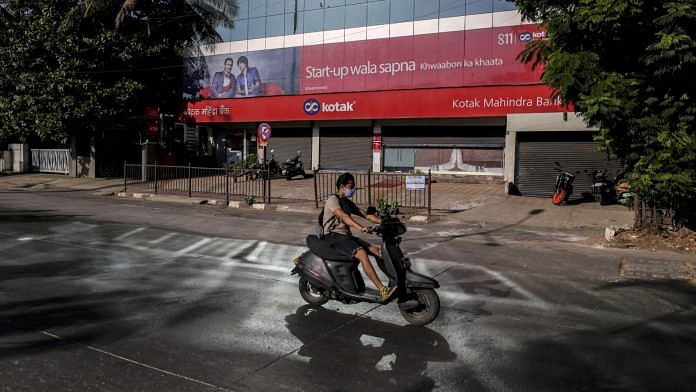India’s lenders and their shareholders are playing a dangerous game of hide and seek.
Financial firms need to raise a record amount of capital, something they would like to do before the central bank’s Covid-19 moratorium on repayment ends next month and they have to disclose a big jump in bad loans. So they have an incentive to pretend that their borrowers have become miraculously stress-free. Investors know this and are trying to ferret out bad news. Valuations are sliding, and if policy makers have a plan for rescuing this vital industry, they’re keeping it close to their chests.
In March, the central bank told lenders they could stop collecting from borrowers for three months after Prime Minister Narendra Modi put a stop to most economic activity to contain the virus. Since then, the regulator has extended the timeout by another three months. But as they announce their June quarter figures, lenders are under pressure from the stock market to show how most of their customer accounts have become regular again after the lockdown was relaxed May 10.
Axis Bank Ltd. shares jumped more than 7% in Mumbai on Wednesday after it said loans under moratorium were down to 9.7% by value from 28% in May. It wants to raise $2 billion to boost its capital buffers after S&P Global Ratings cut its debt rating to junk. Non-bank financier Bajaj Finance Ltd. disclosed that a little under 16% of advances are frozen, a drop from 27% at the end of April. This improvement, however, failed to cheer investors because at least some of it came from tweaking term loans to “flexi” arrangements where borrowers only need to pay interest for one or two years.
More broadly, analysts are finding it hard to swallow the sudden unfreezing, given that an average of 38% of the book for mortgage financiers and 64% for auto lenders was at a standstill in May. Customers paying just the June installment would get off the list of accounts under moratorium, “even if they have not cleared the past dues,” says Elara Securities India Pvt.
Sanford C. Bernstein & Co. analyst Gautam Chhugani has identified two other strategies. The first is to simply deny deferment requests and keep auto-debiting customer accounts. The other method is to help wobbly borrowers with fresh funds, so “the underlying health of the loan won’t be known for a long time until 2021,” he says.
The pandemic has given banks tools to do this. Lenders have approved $17 billion out of a $40 billion state-guaranteed small-business credit program. Media reports suggest part of the money has gone to borrowers on the condition that they repay old loans. Shadow banks, especially ones exposed to troubled property developers, are hawking new bonds. Banks can use the monetary authority’s funding-for-lending program to buy the notes. Here again, they want financiers to keep servicing existing bank debt.
At $1.4 trillion, advances by India’s top banks and other lenders are broadly unchanged from a year earlier. While stagnation in loan growth is only to be expected in a shrinking economy, what’s also worrying is that financiers accounting for three-fifths of the credit are being judged by investors to be worth less than their assets. It’s a sharp deterioration from a year ago, when 40% of institutions by total loans were trading below book value.
Dismal valuations will stop many state-run banks from joining the fund-raising party, which may top $10 billion this year, almost double the record $5.2 billion in 2017. The government must come to the rescue. Economists at State Bank of India suggest lowering the minimum capital norm to 8% from 9% of risk-weighted assets, and deferring the rainy-day capital conservation buffer.
Those two measures will save almost $40 billion. That’s not enough capital. Delinquent corporate debt, which was weighing India down even before the coronavirus, is getting heavier. India Ratings and Research Pvt., a Fitch Ratings affiliate, has pegged additional loan-loss costs from 500 heavily indebted firms at $30 billion, a conservative estimate because bankruptcy courts aren’t taking new cases and asset buyers are looking to wriggle out of commitments. To this, add the post-Covid slide in small firms’ fortunes, as well as losses on micro credit and other individual loans.
Even if a bad bank is set up to take problem loans out of the financial system, the discounted price at which it will buy them means that private capital will have to absorb chunky losses. No amount of gloss by bankers can hide the stress for too long. The market will eventually find it. –Bloomberg
Also read: All about Odisha’s new credit scheme for 7 lakh landless farmers, a ‘first’ in India




Blanket moratorium on loans, will instigate borrowers who would have repaid anyway. Now they will not.
Blanket moratorium on loans incentivises defaulters, & will lead to india’s big self-manifested problem
People of India,
It is time to revolt against the Government.
The Govt can certainly not be trusted.
They have shown how crooked they can be.
It is a known fact that the Govt does not trust us – citizens.
They think everybody else is corrupt like themselves.
Millions of citizens have lost their jobs.
Millions of businesses have failed.
Millions of agriculturists are suffering.
Millions of traders are suffering losses.
Lakhs of people have died because of the COVID crisis.
Overall, the economy has collapsed.
And all the while, the Govt keeps saying that “Everything is fine”.
They think we are all FOOLS !!!
The Govt has done absolutely nothing for us.
Therefore it is time to revolt against the Govt.
This is the only way we can give a new meaning to Democracy.
-The Common Man